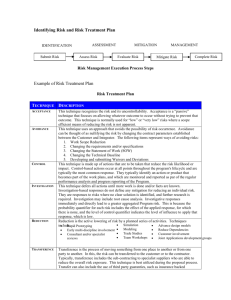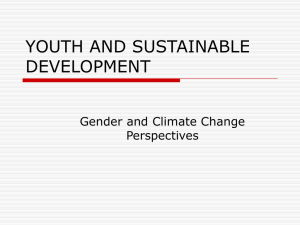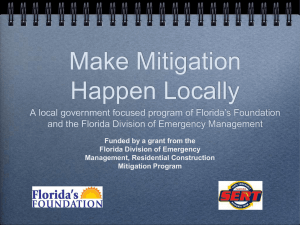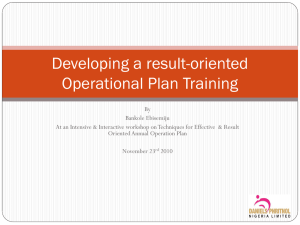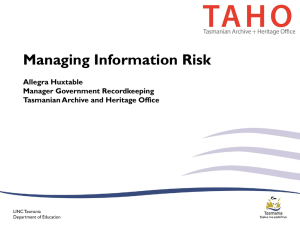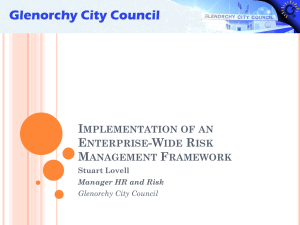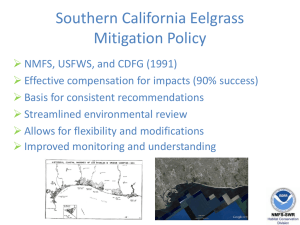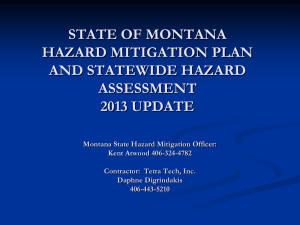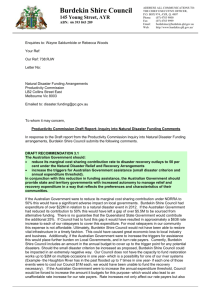What is loss avoidance? - The Association of State Floodplain
advertisement
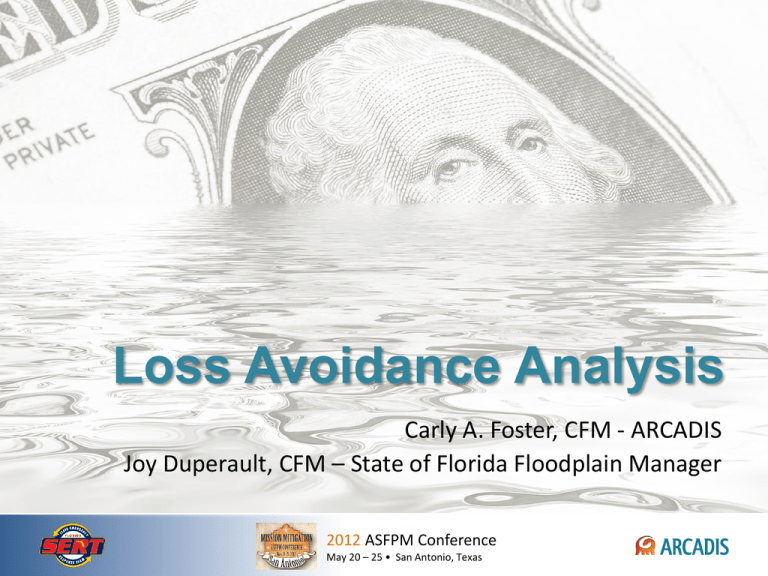
Loss Avoidance Analysis Carly A. Foster, CFM - ARCADIS Joy Duperault, CFM – State of Florida Floodplain Manager 2012 ASFPM Conference May 20 – 25 • San Antonio, Texas Emergency Management Time Horizon Preparedness Response Recovery Mitigation / Resiliency Sustainability Where on this spectrum does public sentiment and the will to make political expenditures lie? “Using data on natural disasters, government spending, and election returns, we show that voters reward the incumbent … for delivering disaster relief spending but not for investing in disaster preparedness (and mitigation) spending. These inconsistencies distort the incentives of public officials, leading the government to underinvest in disaster preparedness (and mitigation), thereby causing substantial public welfare losses.” Citizen Competence and Government Accountability: Voter Responses to Natural Disaster Relief and Preparedness Spending 2009 So, to paraphrase a question posed on a LinkedIn message board… “How do we encourage more action to prevent this from happening?” From the Same Report: There is a Surge in Support for Mitigation… • When the potential costs of inaction are clear AND • Post-disaster BUT, there is also “Some… evidence that governments may be able to take action to make preparedness salient to voters in a more permanent fashion.” What is loss avoidance? EXPECTED DAMAGE WITHOUT MITIGATION – DAMAGE EXPERIENCED WITH MITIGATION – COST OF MITIGATION LOSS AVOIDANCE Benefits = (Hypothetical) Avoided Damage + Avoided Costs + Avoided Loss of Service Loss Avoidance Analysis Results Can Show… • Flood Mitigation is important AND • Money spent on flood mitigation is money well spent At a time when the message may be most likely to come across loud and clear Loss Avoidance Assessment as Part of a System Communicating the Value of Mitigation The State must “document the system and strategy by which the State will conduct an assessment of the completed mitigation actions and include a record of the effectiveness (actual cost avoidance) of each mitigation action.” REQUIREMENT §201.5(B)(2)(IV) Enhanced status has meant millions in extra funding for the State of Florida. Where We’ve Been… • Tropical Storm Fay • North Florida Flood Events What We Discovered… • Record-keeping was inadequate – Difficult to find sites in damage swath – Many project files already archived – Original local project managers often gone – Owners may be new – Best available data often lacking AND • The methodology was primitive Florida’s Method POST DISASTER LOSS AVOIDANCE ASSESSMENT FOR BUILDING MODIFICATION PROJECTS A Review of National Studies Revealed… • Limited project utility • High data demands • Engineers and higher levels of technical expertise • Presumably high costs Florida’s Objectives Simplification Automation Replication Defensibility Ease of Implementation Long-term Tracking of Results How We Pursued Them… • Detailed Literature Review • Data Requirement Analysis • Process Streamlining • Automation • Engineer QAQC Where We’re At… • Project Record Keeping and Data Needs • Event Data Collection and Processing • Loss Avoidance Calculator • Report Development Tools • Technical Details The Building Modifications Calculator Staff Input Other costs/ losses (annual maintenance, lost tax revenue, etc.) not shown here. The Value of Electronic Project Data Robust Vs. Limited Data Because older project files can exist in varying levels of completeness… • Some fields are not required, but add to the robustness of the calculations • Data can be gathered in a variety of ways • Simply keep track of where data was gathered from • For example: – – – – Elevation data? Building data? Project Cost? Yearly or other costs? FEMA’s Preferred Flood Elevation Sources Losses avoided can be calculated for one event or multiple events (life of structure) March 28, 2012 Carly Cermak FFMA Nominal vs. Real Dollars • Nominal – Current to year • Real – normalized to today’s dollars (This is done in three different ways in the calculator) Nominal Losses Avoided Nominal Expected and Actual Losses March 28, 2012 Carly Cermak FFMA Assumptions • A building damage of 50 percent or more would result in demolition (default value specified in FEMA’s BCA Riverine Flood-Full Data Module). • Like others, our depth damage tables don’t take velocity or sediment deposits into consideration. This translates to conservative measurements. • Only financial costs are considered. Benefits of Florida’s Method • Communicates value • Facilitates communication of urgency • Due to automation and limited need for expertise, does not add significantly to the cost of mitigation • Works into current PDA process • Simple and comprehensive • Can help identify mitigation best practices and, hence, facilitate future project selection • Captures longitudinal benefits and can provide the net present value of a project Objectives Accomplished Simplified Automated Replicable Defensible Long-term Tracking of Results Questions? Contacts Joy Duperault - FDEM Joy.Duperault@em.myflorida.com Carly Foster – Technical Questions Carly.Foster@arcadis-us.com 850-228-6979 Thank you!!

